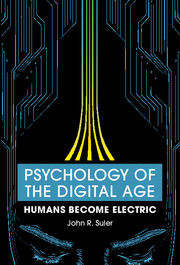Book contents
- Frontmatter
- Dedication
- Contents
- List of Figures
- Foreword
- Preface
- Acknowledgments
- Introduction: Newborns in Evolution
- 1 Cyberpsychology Architecture
- 2 Presence: Be Here Now
- 3 The Dynamic Digital Psyche
- 4 The Disinhibited Self
- 5 Electrified Relationships
- 6 Other Than You Think: Interpersonal Perceptions
- 7 Text Talk
- 8 Image Talk
- 9 I, Avatar
- 10 One of Us: Groups and Communities
- 11 Change and Excess
- 12 Addicted or Devoted
- 13 The Digital Deviant
- 14 Synthesized Realities and Synthesized Beings
- 15 Electric Th erapeutics
- Conclusion: Research and the Researcher
- References
- Index
11 - Change and Excess
Published online by Cambridge University Press: 05 November 2015
- Frontmatter
- Dedication
- Contents
- List of Figures
- Foreword
- Preface
- Acknowledgments
- Introduction: Newborns in Evolution
- 1 Cyberpsychology Architecture
- 2 Presence: Be Here Now
- 3 The Dynamic Digital Psyche
- 4 The Disinhibited Self
- 5 Electrified Relationships
- 6 Other Than You Think: Interpersonal Perceptions
- 7 Text Talk
- 8 Image Talk
- 9 I, Avatar
- 10 One of Us: Groups and Communities
- 11 Change and Excess
- 12 Addicted or Devoted
- 13 The Digital Deviant
- 14 Synthesized Realities and Synthesized Beings
- 15 Electric Th erapeutics
- Conclusion: Research and the Researcher
- References
- Index
Summary
This is just the beginning, the beginning of understanding that cyberspace has no limits, no boundaries.
– Nicholas NegroponteAfter breakfast one beautiful Sunday morning, my wife and I headed directly to our computers. Having recently returned from traveling in Ireland, including a visit to the Cyberpsychology Research Centre at RCSI, I had fallen behind on social media. Inspired by my visit to the Centre, while also hoping to broaden my research for this book, I decided to spend more time on Twitter, in addition to my Google+, Flickr, Instagram, Yik Yak, and two Facebook accounts, not to mention a never-ending flow of email. Previously I had only dabbled with Twitter, so I needed to study its interface in more depth. Because my university had just switched to Gmail, I also had to familiarize myself with that service, which meant spending time learning how to do things I had no trouble doing with the old mail service, including the convenience of downloading mail from the server to Mac Mail on my machine – which, as it turned out, would not be possible unless I upgraded my operating system. That annoyance doubled when I discovered Safari would no longer connect to Facebook, a glitch I tried to troubleshoot, but to no avail, forcing me to set up Firefox. If I was going to use Firefox for Facebook, I might as well create bookmarks for all my social media logins, while reserving Safari for Gmail and web browsing. Juggling two browsers, as well as one window for Gmail and another for Mac Mail, was manageable, though not ideal. With that frustrating decision behind me, I set out in Scrivener to compile a book chapter into Word, only to discover that Word crashed every time I opened the file. This never happened before. Now my annoyance with computers escalated into outright exasperation. After spitting a few choice profanities into the screen, I surged with angry determination to make all of this work the way I wanted it to. No sooner had I set my fingers to the keyboard than the power to our house, suddenly and unexpectedly, went out – for no apparent reason on a beautifully sunny Sunday morning. No electricity, no computer. God speaks in mysterious ways.
- Type
- Chapter
- Information
- Psychology of the Digital AgeHumans Become Electric, pp. 281 - 308Publisher: Cambridge University PressPrint publication year: 2015



